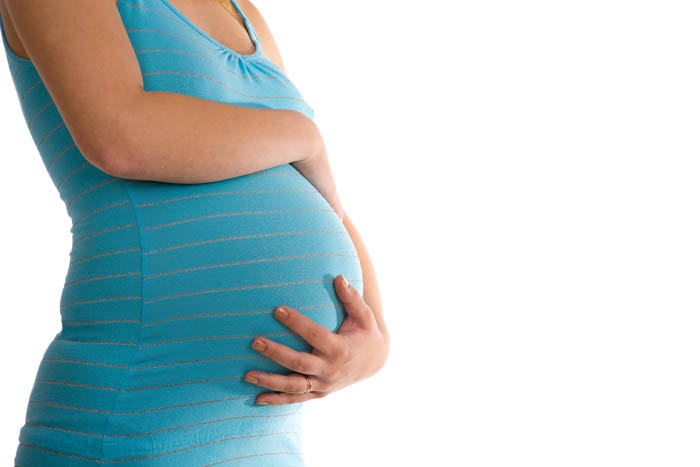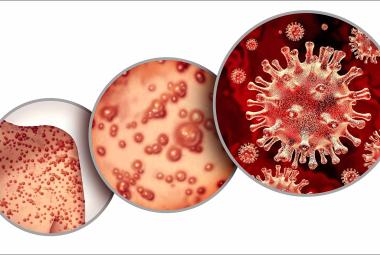Thyroid diseases are among the most common endocrine disorders encountered during pregnancy. An overall incidence including overt and subclinical hypothyroidism (underactive thyroid) during pregnancy is about 2.5 percent.1 When dietary iodine supplementation is adequate (as in the United States), the most common cause of hypothyroidism during pregnancy is chronic autoimmune (Hashimoto’s) thyroiditis. In iodine deficient areas, iodine deficiency itself is associated with hypothyroidism and goiter. Other causes of hypothyroidism, such as prior radioiodine ablation of the thyroid or disorders of the pituitary or hypothalamus, can also occur in pregnant women.2, 3
Clinical symptoms of hypothyroidism during pregnancy include fatigue, cold intolerance, constipation, and weight gain. Many patients are asymptomatic and symptoms may be overlooked or attributed to the pregnancy itself.3
The diagnosis of hypothyroidism during pregnancy is based upon clinical manifestations and laboratory findings. Pregnant women with overt hypothyroidism will have an elevated TSH concentration and a reduced fT4 (free thyroxine) level. The TSH concentration is defined by trimester-specific TSH reference ranges for pregnant women. In addition to an increase level of TSH above 2.5 mU/L during the first trimester, and above 3 mU/L in the second and third trimester, a decrease fT4 concentration (also using reference range for pregnant women) will help clinicians diagnose overt hypothyroidism during pregnancy. Pregnant women with subclinical hypothyroidism will have an elevated trimester-specific serum TSH level but a normal free T4 concentration. Lastly, women with central hypothyroidism from pituitary or hypothalamic disease will not have elevated TSH concentration during pregnancy.2
Hypothyroidism can have adverse effects on the mother and child, depending upon the severity of the disease. Hypothyroidism complicating pregnancy during the first trimester is associated with an increased rate of spontaneous abortion.4 In subsequent trimesters, hypothyroidism has been associated with an increased risk of several complications, including: preeclampsia, gestational hypertension, placental abruption, non-reassuring fetal heart rate tracing, preterm delivery, low birth weight, increased rate of cesarean section, perinatal morbidity and mortality, neuropsychological and cognitive impairment, and postpartum hemorrhage.5-7
A good fetal and maternal outcome depends upon treating maternal hypothyroidism with thyroid hormone (T4). According to the recommendations of American Thyroid Association (ATA) and the Endocrine Society for the Diagnosis and Management of Thyroid Disease During Pregnancy and Postpartum, the goal of treatment is to maintain the mother's serum TSH in the trimester-specific reference range (0.1 to 2.5 mU/L, 0.2 to 3 mU/L, and 0.3 to 3 mU/L for the first, second, and third trimesters, respectively).2
The ATA guidelines recommend that all pregnant women with moderate to severe hypothyroidism should be treated with thyroid hormone (thyroxine, T4) to reach the goal of treatment.2 These patients should be started on full replacement doses (1.6 mcg/kg body weight per day), while patients with TSH < 10 mU/L may become euthyroid with lower doses and can therefore be started on approximately 1 µg/kg daily. TSH should be measured every four weeks during the first half of pregnancy because dose adjustments are often required.3, 8
For pregnant women with subclinical hypothyroidism with positive TPO antibodies, the ATA suggests treatment. However, they have no recommendation of treatment for women with subclinical hypothyroidism with negative TPO antibodies because of uncertain evidence of benefit.2
Women with preexisting hypothyroidism who become pregnant need more T4 during pregnancy. The ATA recommends increasing dose requirements by as much as 50 percent as early as the fifth week of gestation.3
Lylla Ngo, M.D
Thomas Hale, PhD.
InfantRisk Center
References:
- DeCherney A, Nathan L, Laufer N, Roman A. Current diagnosis & treatment : obstetrics & gynecology. 11th ed. ed. New York: McGraw-Hill/Medical; 2013.
- Ross D. Overview of thyroid disease in pregnancy. UpToDate; 2014.
- Ross D. Hypothyroidism during pregnancy: Clinical manifestation, diagnosis, and treatment. UpToDate; 2014.
- Abalovich M, Gutierrez S, Alcaraz G, Maccallini G, Garcia A, Levalle O. Overt and subclinical hypothyroidism complicating pregnancy. Thyroid. Jan 2002;12(1):63-68.
- LaFranchi SH, Haddow JE, Hollowell JG. Is thyroid inadequacy during gestation a risk factor for adverse pregnancy and developmental outcomes? Thyroid. Jan 2005;15(1):60-71.
- Mannisto T, Mendola P, Grewal J, Xie Y, Chen Z, Laughon SK. Thyroid diseases and adverse pregnancy outcomes in a contemporary US cohort. J Clin Endocrinol Metab. Jul 2013;98(7):2725-2733.
- Idris I, Srinivasan R, Simm A, Page RC. Maternal hypothyroidism in early and late gestation: effects on neonatal and obstetric outcome. Clin Endocrinol (Oxf). Nov 2005;63(5):560-565.
- Ross D. Subclinical hypothyroidism. UpToDate; 2014.







